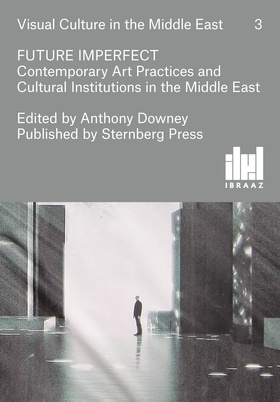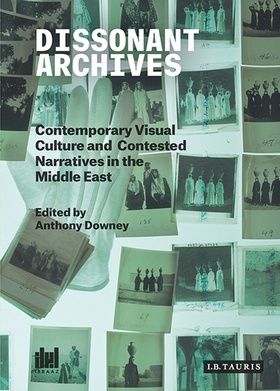Publications
Reviews
Critical reflections on Ibraaz publications
Future Imperfect: Contemporary Art Practices and Cultural Institutions in the Middle East
Edited by Anthony Downey (Sternberg Press, 2016)
Future Imperfect: Contemporary Art Practices and Cultural Institutions in the Middle East critically examines the role played by cultural institutions in producing present-day and future contexts for the production, dissemination and reception of contemporary art in the Middle East and North Africa. It offers critical contexts for a discussion that has become increasingly urgent in recent years – the role of culture in a time of conflict and globalization – and an in-depth critique of the historical state of cultural institutions in an age of political upheaval, social unrest, exuberant cultural activity, ascendant neoliberal forms of privatization, social activism, and regional uncertainty.
Organised around three key areas, Future Imperfect draws attention to the specific antagonisms that have affected cultural production across the region, both in historical and recent post-revolutionary contexts, and offers an in-depth discussion of how cultural producers have developed institutional models through their practices, how cultural institutions operate within the conditions of a global cultural economy, and alongside the often conflicting demands they place on cultural production in the region, is an over-arching concern throughout this volume.
Read the introduction to Future Imperfect: Contemporary Art Practices and Cultural Institutions in the Middle East, by Anthony Downey, by clicking here.
Selected as one of the Top 7 must-have art books of 2016 by Art Radar.
Read an interview with Anthony Downey, editor of Future Imperfect and Editor-in-Chief of Ibraaz, as featured in Di'van (December 2016).
View footage from the launch of Future Imperfect, at Delfina Foundation, London (March 2017), as featured on Majala.
Dissonant Archives: Contemporary Visual Culture and Contested Narratives in the Middle East
Edited by Anthony Downey (IB Tauris, 2015)
Dissonant Archives is the first book to consider the various ways in which contemporary artists from North Africa and the Middle East utilize and disrupt the function of the archive and, in so doing, highlight a systemic and perhaps irrevocable crisis in institutional and state-ordained archiving across the region.
Featuring writing, interviews and original artwork by internationally renowned academics, curators, activists, filmmakers and artists, including Emily Jacir, Walid Raad, Jananne Al-Ani, Basel Abbas and Ruanne Abou-Rahme, Mariam Ghani, Zineb Sedira, and Akram Zaatari, Dissonant Archives includes contributions from Lawrence Abu Hamdan, John Akomfrah, Meriç Algün Ringborg, Héla Ammar, Burak Arıkan, Ariella Azoulay, Vahap Avşar, Sussan Babaie, Alessandro Balteo Yazbeck, Timothy P.A Cooper, Joshua Craze, Laura Cugusi, Ania Dabrowska, Nick Denes, Chad Elias, Media Farzin, Gulf Labor, Tom Holert, Adelita Husni-Bey, Maryam Jafri, Guy Mannes-Abbott, Amina Menia, Shaheen Merali, Naeem Mohaiemen, Mariam Motamedi Fraser, Pad.ma, Lucie Ryzova, Lucien Samaha, Rona Sela and Laila Shereen Sakr (VJ Um Amel).
Dissonant Archives is featured in The Brooklyn Rail.
Dissonant Archives is featured as favourite pick from the Arnolfini – Centre for Contemporary Art in Bristol.
The book was reviewed by Miriam Rosen for Camera Austria (vol. 132).
The book has been selected by Blouin ARTINFO as one of the Must-Read Art Related Books from 2015, as well as by ArtAsia Pacific (Almanac vol. XI) as one of the outstanding books on the art of the Asia-Pacific region.
Read a review of Dissonant Archives from the journal The American Archivist (volume 79, issue 2, Fall/Winter 2016) by following this link.
View a preview of Dissonant Archives: Contemporary Visual Culture and Contested Narratives in the Middle East by clicking the box below.
Uncommon Grounds: New Media and Critical Practices in North Africa and the Middle East
Edited by Anthony Downey (IB Tauris, 2014)
In this groundbreaking book, a range of internationally renowned and emerging academics, writers, artists, curators, activists and filmmakers critically reflect on the ways in which visual culture has appropriated and developed new media across North Africa and the Middle East. Examining the opportunities presented by the real-time generation of new, relatively unregulated content online, Uncommon Grounds evaluates the prominent role that new media has come to play in artistic practices – and social movements – in the Arab world today. Analysing alternative forms of creating, broadcasting, publishing, distributing and consuming digital images, this book also enquires into a broader global concern: does new media offer a 'democratization' of – and a productive engagement with – visual culture, or merely capitalize upon the effect of immediacy at the expense of depth?
Contributors to the volume include: Sarah Abu Abdallah, Roy Samaha, Sophia Al-Maria, Fayçal Baghriche, Franco 'Bifo' Berardi, Wafaa Bilal, Sheyma Buali, Maymanah Farhat, Ganzeer, Hans Haacke, Laura U. Marks, Dina Matar, Aleya Hamza, Edit Molnár, Timo Kaabi-Linke, Jens Maier-Rothe, Dina Kafafi, Azin Feizabadi, Amal Khalaf, Omar Kholeif, Tarek Khoury, Gulf Labor, Mosireen, Rabih Mroué, Nat Muller, Philip Rizk, Nermin Saybaşılı, Annabelle Sreberny, Tarzan and Arab, Derya Yücel, and Maxa Zoller.
Download a PDF of the introduction to Uncommon Grounds and the essay 'For the Common Good? Artistic Practices and Civil Society in Tunisia' by editor Anthony Downey by following this link.
Voted #1 by Hyperallergic in their Best of 2014 list: Top 10 Art Books!
"A valuable volume...well edited."
- Jane Jakeman, The Art Newspaper
"Groundbreaking."
- Bespoke International Magazine
"Edited by the always insightful Anthony Downey, Uncommon Grounds is a good place to start for those seeking to understand the role of new media in the region. This isn't a conventional art book, but an exploration of new media and its impact on a land often manipulated and colonized (particularly through images) by foreign forces."
- Hrag Vartanian, Hyperallergic
"[Uncommon Grounds] presents a new analysis paradigm that moves beyond merely framing the elements of the social movements within their historical backgrounds and political interpretations, and instead engages with the specifics of the accountability of new media in the democratic movements."
- Arek Dakessian, LSE Blog
"What readers get out of [Uncommon Grounds] is an intimate and close reading of certain arts practices situated in various local contexts within the Middle East; a reading that does not claim to represent or diagnose, but rather pools together the raw materials for an interdisciplinary discussion into the politics of visual or artistic representation, grounded in case studies and inserts that illustrate some of the theoretical discussions being had."
- Wided Khadraoui, Kalimat
"Uncommon Grounds provides a crucial and necessary discussion and critique of recent cultural phenomena and artistic practices in new media throughout the MENA region."
"Uncommon Grounds is an ambitious anthology that attempts to take the measure of ... the widespread impact and appropriation of social/new media throughout visual culture in its broadest sense."
- Jay Murphy, Transnational Cinemas, vol. 6, 2015
"In countries with rich histories, changing boundaries and war/conflict, artists are sharing histories, reflecting on the past to see the present and speaking truth to power. Check out the thriving artistic practices emerging in the Middle East and North Africa."
"Not only does (Uncommon Grounds) present an interesting approach to the interdisciplinary, opening up the scene to a diversity of participant actors and voices, the book speaks in a variety of registers..."
- Morad Montazami, Critique d'art (French)
Featured on the Intercross Summer 2015 Reading List, reviewed in Neural #51: Revive (Summer 2015), and included in the Art Asia Archive HK.
Read exclusive interviews with Anthony Downey, editor of Uncommon Grounds, and Editor-in-Chief of Ibraaz as featured in Jadaliyya and the IB Tauris blog.
Slavs and Tatars: Mirrors for Princes
Edited by Anthony Downey (jrp|ringier, 2015)
A form of political writing often called advice literature shared by Christian and Muslim lands, during the Middle Ages, mirrors for princes attempted to elevate statecraft (dawla) to the same level as faith/religion (din). These guides for future rulers – Machiavelli's The Prince being a widely known example – addressed the delicate balance between seclusion and society, spirit and state, echoes of which we continue to find in the US, Europe and the Middle East several centuries later.
Today, we suffer from the very opposite: there's no shortage of political commentary but a notable lack of intelligent, eloquent discourse on the role of faith and the immaterial as a valuable agent in society or public life.
Mirrors for Princes brings together the writing of pre-eminent scholars and commentators using the genre of medieval advice literature as a starting point to discuss contemporary politics in Turkey, Indian television dramas, fate, fortune and governance, and advice for female nobility.
The illustrated essays are accompanied by an interview with Slavs and Tatars.
Mirrors for Princes is edited by Anthony Downey, Editor-in-Chief of Ibraaz, and is published on the occasion of Slavs and Tatars' exhibition at NYU Abu Dhabi.
Mirrors for Princes has been selected by the editors of ArtAsiaPacific as one of the outstanding books focussing on art of the Asia-Pacific region, and is featured in their latest edition, Almanac vol. XI – its survey of 2015. Read the full review here.




